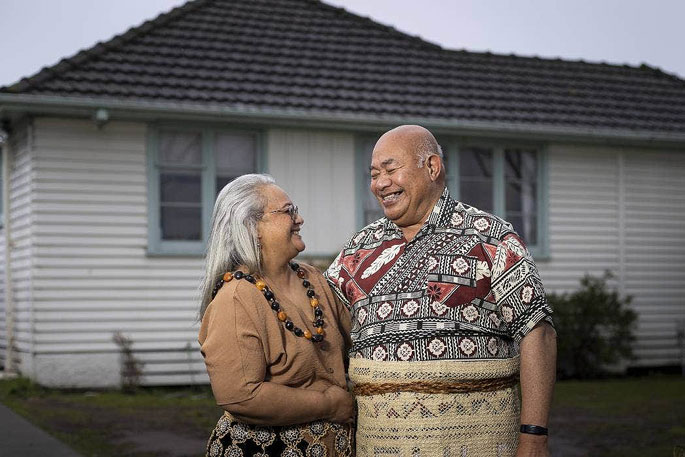At the age of 68, Siale Faitotonu must have a shout at being the country's oldest first-home buyer.
In July, Faitotonu, his wife Milika, 51, and two of their adult children, bought a home near Christchurch together, pooling their savings for a deposit, and using their combined incomes to qualify for a Kiwibank's co-own home loan.
Now they want other Pacific families to hear about how the banking system is starting to learn how it can better serve them, and lift Pacific home ownership rates.
Te Ara Ahunga Ora The Retirement Commission says homeownership among Pacific peoples in New Zealand is the lowest among the recorded ethnicities, with just 21 per cent owning, or partly owning, a home as of 2018, compared to 52 per cent of the entire population.
Faitotonu is a geomechanics laboratory technician at the University of Canterbury with no intention of retiring any time soon.
He had opportunities to buy when he was younger, but rents were low, and remembers not wanting to be locked into a mortgage.
He also married late, at the age of 41, though Milika, an early childhood teacher, says the main reason he didn't buy a home was probably because he spent so much of his life and money helping others in Tonga, and in the Tongan community in New Zealand.
That selflessness led to him being named a member of the New Zealand Order of Merit in 2021.
'Because he was the eldest of seven his income was used to help the family back in Tonga,” says Milika.
'Most of the money was sent back to the islands to help, all his single life.”
'He should have bought the house back then, when [he] was single, and it was cheap.”
Faitotonu says he looked after his family 'in the Tongan way”, but late last year, Milika took a leading role after the family was given eight months notice on the home they were renting.
She had heard of Kiwibank's co-own loans through the Faka'amanaki Tongan language radio, and a friend from Auckland told them to speak to the bank.
The woman from Kiwibank who helped them was mobile mortgage manager Lorraine Wetzell, a German Samoan woman, and the family felt she immediately understood them.
'She was the magic,” says Milika. 'We felt we knew each other, because she knew how our people think.”
Once the family decided they could afford to buy a home, there was some hard saving to be done.
They needed to add $40,000 to their savings in those eight months, and Milika, son Tamatautonu, and daughter Akonga, did it, paring their spending right back.
'We never saved that much in our whole lives,” she says.
Faitotonu says the saving was 'forcefully applied” by his wife.
They bought a seven-year-old house in Rolleston, and joke about friends who tell them they live now in a 'palangi” suburb, a term used by Pacific people analogous to the term Pākeha in te reo Māori.
They continue to live true to their Pacific culture after their move to Rolleston 'out in the far bush” in the Selwyn district to the east of Christchurch.
'It's not only us and our biological children,” says Milika.
'We take in all sorts of children into our house, all Pacific boys, all rugby boys, the house is full. Our house is like a community house.
'We have a big heart. We love the whole world. We have five biological children, plus 20-plus ‘adopted' that we care for.”
They hope other families will follow their example.
Other Tongan families they know are talking to Kiwibank because they have seen what the Faitotonus have done.
Milika would like to see Pacific families talk about home ownership in the way she imagines Palangi families do.
'It's not something we talk or plan. Buying a house is not a normal conversation in our Pacific community compared to a Palangi. You have already talked to your kids about buying a house at 18,” she says.
It was especially important for young Pacific men and women.
'It boosts their confidence, encourages them, thinking this is possible. It puts them into another different world,” she says.



0 comments
Leave a Comment
You must be logged in to make a comment.